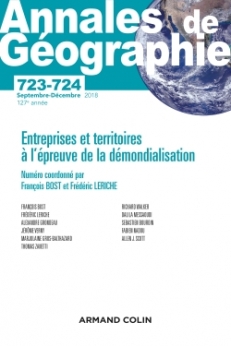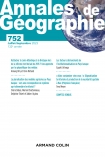
Annales de géographie - n°723/724 (5-6/2018)
Pour acheter ce numéro, contactez-nous
Recevez les numéros de l'année en cours et accédez à l'intégralité des articles en ligne.
Les entreprises transnationales sont aujourd’hui de plus en plus nomades. Ce mouvement de déterritorialisation s’accentue sous l’effet de la financiarisation qui détache les acteurs économiques des contraintes spatiales. Face à ce capitalisme financier concentré dans quelques espaces de commandement, il existe un autre modèle constitué par les firmes mondiales à fort enracinement, que nous proposons d’analyser à travers l’ancrage territorial de Michelin. Nous faisons alors l’hypothèse de l’existence d’un nouveau régime d’accumulation, celui du capitalisme territorial. Instrumentalisant le territoire selon ses intérêts, il est également caractérisé par une forme de responsabilité territoriale consentie en l’échange d’un pouvoir politique. Enfin, ce régime capitalistique permet de dépasser la contradiction entre nomadisme et ancrage, et de perpétuer la domination territoriale du capital.
Transnational companies are now becoming increasingly nomadic. This trend towards deterritorialization is accentuated under the effect of financialization which detaches economic actors from spatial constraints. Beside this financial capitalism, concentrated in a few spaces of command, another model exists formed by the global firms strongly rooted in their area. The authors aim to analyse these through the territorial anchoring of Michelin. They then make the hypothesis of the existence of a new mode of accumulation : territorial capitalism. Using the territory according to its own interests, it is also characterized by a form of territorial responsibility granted in exchange for political power. Lastly, this capitalist system makes it possible to overcome contradiction between nomadism and anchoring, and to perpetuate the territorial domination of capital.

